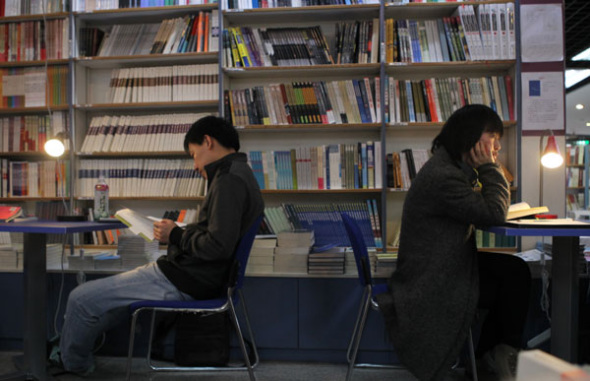 |
| Readers burn midnight oil in Beijing's first 24-hour bookstore, the Sanlian Taofen Bookstore. [Zou Hong/China Daily] |
"A bookshop is not old-fashioned. This is an important campaign we need to do," says Patrick Neale, co-owner of Jaffe and Neale Bookshop & Cafe and president of the Booksellers Association in the UK.
"Amazon likes to tell people that bookshops are old-fashioned and are for old people, but it's not true. You can get a modern shopping experience."
Among the "cool" services and events that Jaffe and Neale provides are regular creative writing courses, wine tastings and book recommendation parties.
"We booksellers need to take our books and services to customers rather than waiting for them to visit our shops," Neale says. He cites his bookstore's tent at local music festival as an example.
"The Chipping Norton Music Festival attracts 20,000 people annually. We pack the books and cafeteria stuff and 'reproduce' our bookstore in a tent at the festival. The sales during the three days can be as big as that of three weeks in the store."
Founded in 2000, Jaffe and Neale survived the downturn of brick-and-mortar bookstores in the UK from 2008 to 2013. Due to the economic downturn and the effect of e-books and online booksellers, the number of stores decreased from 1,350 stores to fewer than 1,000.
It was a tough period for physical bookstores all over the world. Even a giant like Borders, the second largest bookstore chain in the United States, was affected. It went bankrupt and closed its last 399 stores in 2011.
At a forum about the future development of independent bookstores hosted by Fang Suo in Guangzhou in February, speakers said the hardest period for brick-and-mortar stores has passed.
The speakers at the forum were founders and managers of bookstores that have stood the test of time, including Fang Suo, Jaffe and Neale, All Sages Books in Beijing, Eslite in Taiwan and Tsutaya in Japan, and observers of the publishing industry and bookstores.
We recommend:
